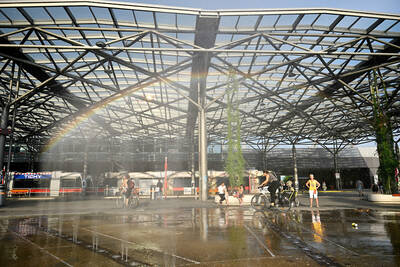Angola’s president would no longer be directly elected by the people under a new constitution approved by parliament.
Critics say giving parliament the power to name the president would only further entrench Angolan President Eduardo Dos Santos, who has been in power since 1979. Dos Santos has said adopting the method South Africa and others in the region use to pick a president is more efficient and less costly.
The main opposition party, the National Union for the Total Independence of Angola (UNITA), boycotted Thursday’s vote on the proposed constitution, which was approved 186-0, with two abstentions.
The charter must now be approved by the Constitutional Court, a step seen as a formality.
Even as multi-party elections become the norm across Africa after decades of dictatorship and one-party rule, the entrenchment of powerful parties is seen as undermining democracy. In many cases, the parties in power are embraced by voters for having led campaigns against colonial rule or, in the case of South Africa, apartheid.
It becomes almost impossible for opposition politicians to make inroads when an iconic party also has control of the state broadcaster — often the medium with the widest reach in Africa — earns the loyalty of a civil service that comes to see itself as part of the party and fails to control corruption.
Dos Santos is under pressure from rights groups at home and abroad to strengthen democracy, but at times he seems to see the effort as a distraction from rebuilding a country devastated by war.
Dos Santos’ Popular Movement for the Liberation of Angola (MPLA) has been in power since Agostinho Neto became the first president of independent Angola in 1975. Upon Neto’s death in 1979, then-planning minister dos Santos became president.
At a party meeting late last year, dos Santos said presidential elections would be delayed from last year to at least 2012, and indicated then that he preferred for voters to elect a parliament, which would then elect the president. That ensures the party that controls parliament controls the presidency.
The next parliamentary elections are in 2012. The 2008 parliamentary vote, the first in 16 years, was won overwhelmingly by dos Santos’ MPLA.
Dos Santos last contested an election in 1992, during a break in a civil war that started in 1975 after the country gained independence from Portugal. Fighting broke out anew after UNITA refused to accept results showing it had lost the 1992 polls.
The war ended in 2002, when the army killed UNITA rebel leader Jonas Savimbi.
Angola is rich in diamonds and oil, but its people are impoverished and its infrastructure in ruins.
With oil prices falling, the IMF gave Angola a US$1.4 billion loan in November. To get the loan, Angola had to agree to regular, public reviews of its finances.
Angola ranks among the world’s most corrupt countries, according to watchdog Transparency International, which surveys businesses and experts to measure perceived levels of public sector corruption around the globe.

‘THEY KILLED HOPE’: Four presidential candidates were killed in the 1980s and 1990s, and Miguel Uribe’s mother died during a police raid to free her from Pablo Escobar Colombian presidential candidate Miguel Uribe has died two months after being shot at a campaign rally, his family said on Monday, as the attack rekindled fears of a return to the nation’s violent past. The 39-year-old conservative senator, a grandson of former Colombian president Julio Cesar Turbay (1978-1982), was shot in the head and leg on June 7 at a rally in the capital, Bogota, by a suspected 15-year-old hitman. Despite signs of progress in the past few weeks, his doctors on Saturday announced he had a new brain hemorrhage. “To break up a family is the most horrific act of violence that

HISTORIC: After the arrest of Kim Keon-hee on financial and political funding charges, the country has for the first time a former president and former first lady behind bars South Korean prosecutors yesterday raided the headquarters of the former party of jailed former South Korean president Yoon Suk-yeol to gather evidence in an election meddling case against his wife, a day after she was arrested on corruption and other charges. Former first lady Kim Keon-hee was arrested late on Tuesday on a range of charges including stock manipulation and corruption, prosecutors said. Her arrest came hours after the Seoul Central District Court reviewed prosecutors’ request for an arrest warrant against the 52-year-old. The court granted the warrant, citing the risk of tampering with evidence, after prosecutors submitted an 848-page opinion laying out

STAGNATION: Once a bastion of leftist politics, the Aymara stronghold of El Alto is showing signs of shifting right ahead of the presidential election A giant cruise ship dominates the skyline in the city of El Alto in landlocked Bolivia, a symbol of the transformation of an indigenous bastion keenly fought over in tomorrow’s presidential election. The “Titanic,” as the tallest building in the city is known, serves as the latest in a collection of uber-flamboyant neo-Andean “cholets” — a mix of chalet and “chola” or Indigenous woman — built by Bolivia’s Aymara bourgeoisie over the past two decades. Victor Choque Flores, a self-made 46-year-old businessman, forked out millions of US dollars for his “ship in a sea of bricks,” as he calls his futuristic 12-story

A man has survived clinging to the outside of an Austrian high-speed train, Austria’s state railway said on Sunday, reportedly after it left while he was having a cigarette break. The man late on Saturday grabbed onto the outside of the train at St Poelten, west of Vienna, and was later taken onboard after the train performed an emergency stop, railways spokesman Herbert Hofer said. “It is irresponsible, this kind of thing usually ends up with someone dying,” he said. “And you’re not just putting yourself in danger, if you end up under the train there’s rescuers, there’s police, fire